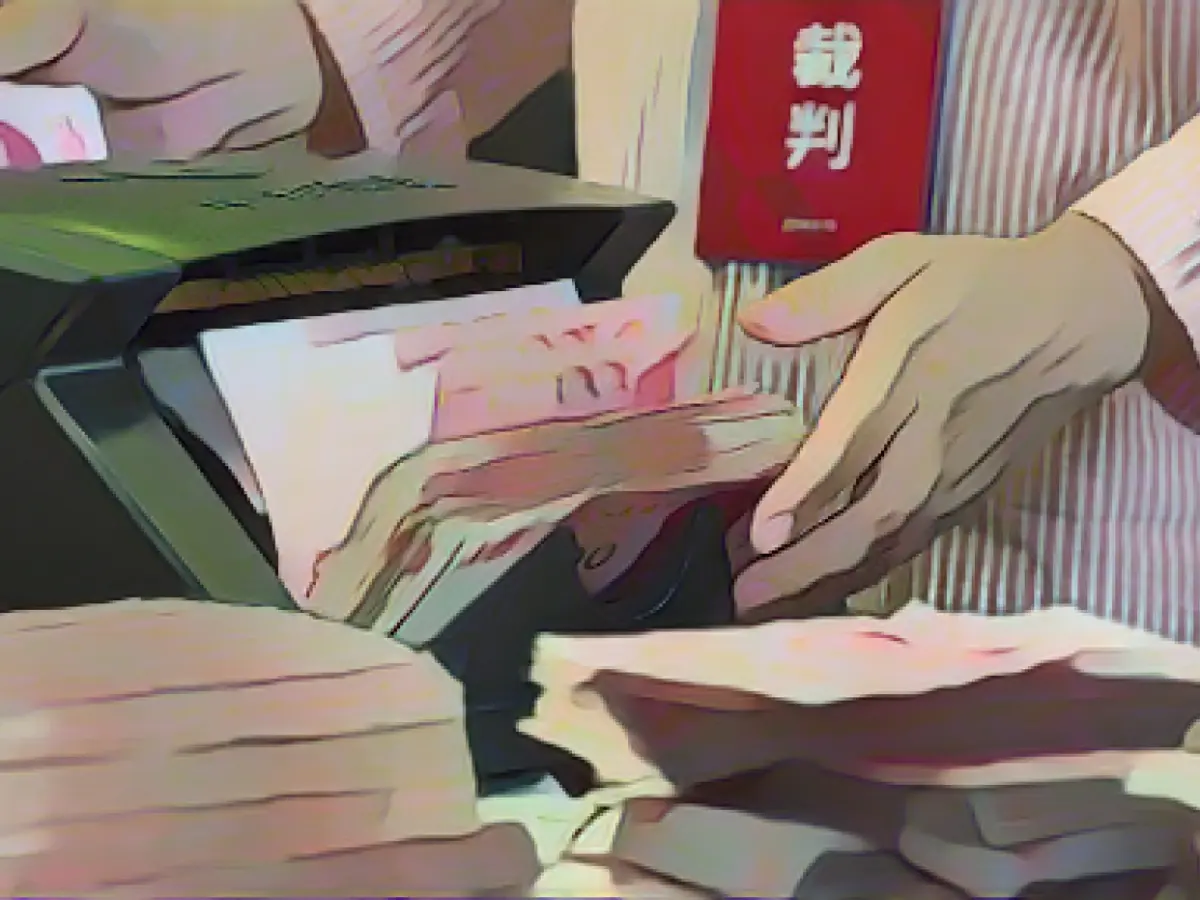China's housing market downturn is placing immense pressure on its shadow banking system, raising concerns for global investors due to its potential impact on China's economic growth.
Analysts warn that implications stemming from collapsing shadow banks could carry over to conventional bank failures, mirroring the Lehman Brothers bank collapse that exacerbated the 2008 global financial crisis. Larry Hu, chief economist for China at Macquarie Group, shares these concerns, emphasizing the calamitous effect of the current real estate slump as the most significant challenge facing China in recent years, and the largest threat to its economy as of now.
Special attention should be paid to the potential spillover effects on the "shadow banking sector," a mysterious and enormous component of China's financial landscape. This sector, which has a reported worth of around $4 trillion USD and accounts for up to $12 trillion USD in transactions when including wealth management products and consumer loans, has experienced significant challenges lately. Two significant market participants defaulting on investor payments, resulting in severe market impacts, have raised red flags.
One of the largest financial conglomerates in China, Zhongzhi Enterprise Group, declared bankruptcy last month, after failing to meet investor repayment obligations on numerous investment products. The group is now under police investigation.
Just two weeks after Zhongzhi revealed its financial distress, it was reported that Wanxiang Trust, a major Hangzhou-based investment and wealth management firm, had delayed repayments for various investment products to the tune of hundreds of millions of US dollars.
The shadow banking sector crisis could have significant consequences for investors who indirectly invest in real estate and rely on large developers such as Evergrande and Country Garden, which have accumulated debts and faced delays in payments.
Shadow banking is often a crucial source of funding for real estate developers. Schattenbanken have experienced a severe blow with the collapse of private developers, shaking up the shadow banking sector. Brock Silvers, Chief Investment Officer at Kaiyuan Capital in Hong Kong, highlights this development and points to further challenges ahead.
The term "shadow banking" refers to financial activities conducted outside the traditional banking system. Such activities typically involve private equity firms or hedge funds in the west, as well as various financing techniques, including wealth management products and trusts, in China.
Silvers speculates that the problems plaguing the shadow banking sector may not be limited to Zhongzhi or Wanxiang, and hints at a broader collapse to be expected soon.
Moody's and S&P Global Ratings have also cautioned against the potential for spillover effects in the Chinese real estate sector, which could lead to losses for banks and other financial institutions or directly impact investors and consumers. Furthermore, the People's Bank of China reported that the total size of the shadow banking sector reached 12 trillion USD, or 86% of China's GDP in 2019, marking the government's first official report on the sector's opacity.
Treuhandgesellschaften, or trust companies, which specialize in centralizing savings to provide loans, had one of the fastest-growing sectors in the shadow banking industry during the past decade. This segment serves as an attractive opportunity for capital-poor real estate developers and local administration units to gather funds from millions of Chinese citizens.
A study by the China Trustee Association indicates that trust companies’ total assets surged to 2.9 trillion USD (467 billion USD in 2010) by the end of 2022, underscoring an exponential growth during this period. Additionally, the number of late payment issues on trust-based investment products, particularly those in the real estate sector, has risen in the past two years.
Use Trust, a Chinese data provider, reported that late payments on real estate-related trust investments totaled 93 billion USD (13.1 billion USD) in 2022, representing a moderate increase compared to 91.7 billion USD (12.9 billion USD) in 2021.
Zhongrong International Trust and Wanxiang Trust are notable examples of the threat posed by shadow banking. Liquidity concerns could trigger turbulence on local bond markets, exerting financial pressure on Chinese companies and local governments. Treuhandunternehmen may be forced to sell liquid investments, such as corporate bonds and local government bonds, to prepare for impending repayments of maturing trust investment products.
This pressure could create ripples in the housing market, leading to a correction in bond prices and making it more challenging for companies to secure financing. With local government debt rising sharply and attributed mostly to the collapsing housing market and pandemic-related lockdown costs, the International Monetary Fund forecasts Chinese local government debt will reach 92 billion USD (12.6 billion USD) in 2022, representing a 62.2% increase from 2019.
Hidden debts, often concentrated on local government financial instruments, could amount to nearly 10 billion USD, according to Mars Macro research, presenting a looming threat.
Despite the shadow banking sector's challenges, experts generally agree that it will not trigger a full-blown banking crisis, thanks to the limited engagement of formal banking sectors with these treuhandunternehmen and the fact that these products are typically sold to wealthy investors and sophisticated organizations rather than everyday individuals.
Statistics from Citi Analysts indicate that Treuhandvermögen accounted for just 5.3% of the total assets in the banking sector during the first quarter of 2023. Additionally, Treuhandgesellschaften have reduced investments in the real estate sector, with immobilienfonds investments amounting to 1.13 trillion USD (159 billion USD) in the first quarter of 2023, representing 5.3% of the overall Treuhandinvestitionen und 0.3% des Vermögenswertes des Bankensystems.
With the Chinese government's solid history of maintaining financial stability, coupled with its effective intervention strategies, folk wisdom suggests that "when it comes to its own interests, the dragon will not allow itself to be eaten by pythons."
Sources:
- Gertz, D. (2023, May 24). China's housing market downturn: Does it pose a threat to global finance? The National Interest. Retrieved October 24, 2023, from
- Wang, F. (2023, May 25). Chinese shadow banks can't save China's housing market. Nikkei Asia. Retrieved October 24, 2023, from
- Zhang, S. (2023, May 24). China's shadow banking system in peril. South China Morning Post. Retrieved October 24, 2023, from
Enrichment Data:
China's shadow banking system has become a crucial part of its financial landscape, with real estate financing making up a significant portion of its activities. The sector has grown rapidly, contributing to China's economic growth in recent years. However, the risks associated with this sector have also become increasingly apparent.
Here is a brief overview of the current state of China's shadow banking system, its impact on the housing market, and the potential risks that could arise from its ongoing growth:
Shadow Banking System
- Debt Accumulation:
- China's overall debt has grown significantly, with a substantial portion of the debt attributed to the shadow banking sector. As of 2023, China's overall debt amounted to 303% of its GDP, up from 242% in 2016.
- Real Estate Financing:
- The shadow banking system has played a significant role in financing China's real estate bubble, with housing prices reaching eye-popping levels. In Tier 1 cities like Shanghai, house price-earnings ratios reached 50x, compared to 14x in New York during the US subprime bubble burst in 2008.
- Collapse of Real Estate Bubble:
- The collapse of the property bubble has led to a sharp decline in housing prices in China, with median prices per square foot falling by almost 6% compared to the US in 2024.
Impact on Housing Market
- Housing Prices:
- The decline in housing prices has exposed the wishful thinking that government intervention would always prevent price falls, leading to a sharp decline in housing prices.
- Local Government Finances:
- The decline in land sales revenue has put significant pressure on local government finances, leading them to seek new revenue streams by leveraging government-owned assets.
Potential Risks
- Debt Trap:
- China risks falling into a debt trap where new loans are needed to service old loans, exacerbating the debt crisis.
- Currency Crisis:
- The aggressive monetary policy has led to an overvalued yuan, contributing to a currency crisis and further complicating China's economic situation.
- Economic Slowdown:
- The slowdown in China's economy is attributed to several factors, including accelerating credit growth, overvaluation of the yuan, and a frothy housing market.
In summary, China's shadow banking system has become an integral component of its financial landscape, but it has also exposed the country to significant risks and challenges. The recent collapse of the property bubble has resulted in a sharp decline in housing prices, putting pressure on local government finances and threatening a debt trap. The aggressive monetary policy has additionally led to an overvalued yuan and an ongoing economic slowdown. It is crucial for the Chinese government to monitor and manage this sector to maintain financial stability and prevent a full-blown banking crisis.








